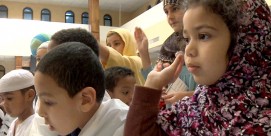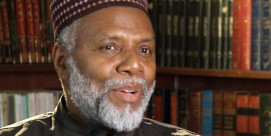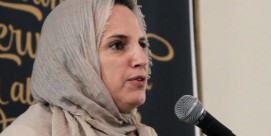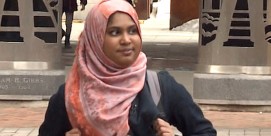Women’s Spiritual Voices: Muslim, Jewish, and Christian
On May 21, 2009 the Moroccan American Cultural Center and the American Jewish Committee sponsored an interfaith panel discussion in New York City on “Women’s Spiritual Voices: Crossing Continents, Finding Common Ground.” Panelists explored the roles of women religious leaders in Islam, Judaism, and Christianity, and they included three Moroccan women, Fatima Zahra Salhi, Nezha Nassi, and Ilham Chafik, who are “mourchidates” or religious counselors; Mahara’t Sara Hurwitz, a member of the rabbinic staff at the Hebrew Institute of Riverdale, New York; Rabbi Stephanie Dickstein, spiritual care coordinator at the Jewish Board of Family and Children’s Services in New York City; the Reverend Elizabeth Garnsey, associate rector at the Episcopal Church of the Heavenly Rest in New York City; and moderator Sarah Sayeed of the Interfaith Center of New York. In 2006, Morocco’s King Mohammed VI created the mourchidates program for women to serve as religious counselors in community health programs, women’s detention centers, and mosques. Fifty mourchidates are chosen from approximately 1,000 highly qualified applicants, and they receive intensive training in 32 subject areas including law, psychology and theology. They must also have learned at least half of the Qur’an by heart. Watch excerpts from the panel discussion edited by Religion & Ethics NewsWeekly intern Juliana Comer, a senior at James Madison University.
Sarah Sayeed, Moderator (Interfaith Center of New York): The first question that’s going to guide us right now is: What is your role within your respective faith tradition?
Fatima Zahra Salhi (Mourchidate from Morocco): My name is Fatima, and I am also mourchidate working with the ministry in charge of religious affairs in Morocco, and I am extremely happy to be here among you because I believe that what gathers us together is more than what separates us.
Mahara’t Sarah Horowitz (Rabbinic Staff, Hebrew Institute of Riverdale, New York): Right before I was going to college, my parents insisted that I take a vocational test to see where my strengths lie. So after this two-day intensive testing, the results showed that I would be best suited for clergy. At the time I laughed, because as a female Orthodox woman there was no opportunity for women to be rabbis.
Rev. Elizabeth Garnsey (Associate Rector, Episcopal Church of the Heavenly Rest, New York City): I just have an example of a young girl who is eight in my congregation, who grew up in the Episcopal Church. Her grandmother took her on a trip to Virginia to visit the relatives who were of another denomination. In that church there were all male clergy. The little girl said to her grandmother, “Grandma, there’s something wrong with this church. There are no women up there.” She is used to seeing women at the altar. The Episcopal Church just elected, two years ago, as Presiding Bishop, a woman, Katharine Jefferts Schori, who is a former oceanographer, a very brilliant woman and very articulate. She’s the first woman to reach that level of leadership in our church since Elizabeth I in 1500, so it’s a big deal. Among all the provinces in the Anglican Communion she’s the only woman at that level. So at the other end of this spectrum of perception and welcome, her bishop colleagues from certain places of the world will not receive communion if she’s present.
Nezha Nassi (Mourchidate from Morocco): When I counsel women prisoners, they feel more at ease talking to me and opening up to me, and I have the tools actually to talk to them and try to orient them in the right way. Of course, this opportunity was not available to us until the creation of this program, imams and mourchidates. I really don’t feel any difference between the work I do and what the imam does. In fact, I do chair a committee that is composed of imams and mourchidates.
Sarah Sayeed: Is it important to have women doing the kinds of things you’re doing, and is there something new or different that you are bringing as women to this role that your male counterparts cannot do?
Rabbi Stephanie Dickstein (Spiritual Care Coordinator, Jewish Board of Family and Children’s Services, New York City): I would say that one thing that is probably different about my rabbinate is that I have never given a sermon using a baseball or other sports metaphor. Another difference I think—and certainly we saw this in chaplaincy work and I see it in my counseling now—is that being a woman makes me more available to people. And so when I walk in the door of someone who has been estranged from Judaism, or never really involved at all—they weren’t rejecting anything; they just never had it—when I walked in the door as a woman rabbi, there was an immediate message, which was: Hey, there’s possibilities for me, even though I don’t fit a certain…I don’t come from a certain background, or I may be angry. If you can be there as a rabbi, maybe there’s possibilities for me within Judaism as well.
Rev. Elizabeth Garnsey: I don’t feel like I’m really on the cutting edge. I feel I’ve inherited the fruits of the hard work of the pioneers in my church and that my responsibility is to take my place as an equal among my colleagues. That’s its own project day to day, and I have to contend with the prejudices of others and assume my role and realize that others can also do the work to learn how to accept and treat females in positions of leadership, just as it happens in the outside world.
Mahara’t Sarah Horowitz: In the Orthodox community it is still revolutionary. Seeing a woman in the forefront of the clergy is revolutionary, however the day-to-day job that I perform is entirely unrevolutionary, entirely normal. A rabbi is a teacher, a role model, a pastoral counselor, somebody who gives guidance in Jewish law as well as life, somebody who facilitates life cycle events. All these roles are functions that a woman can and should and do perform. There are a few things that women in the Orthodox world still do not do. Sometimes these roles are seen as very public. For example—I saw this in some of the restrictions that you have, so I relate—that although on a Shabbat morning, a Sabbath morning, I can address the entire congregation and give a sermon, what I don’t do is lead services.
Nezha Nassi: Concerning leading prayer, we are Malakites. Our doctrine is the Malakites, where woman is not allowed to direct prayer. This is the reason why there was no debate on whether the woman should lead prayer or not, and there was no conflict.
Mahara’t Sarah Horowitz: There are certain areas, of course, that women feel more comfortable coming to me specifically as a woman when it has to do with areas relating to sexuality and other topics that are more sensitive. I’ve found that, whereas women were not coming to rabbis to ask these sensitive questions and they were kind of just suffering themselves, now women have a spiritual leader to turn to.
Ilham Chafik (Mourchidate from Morocco): Concerning the relationship, or what we bring to women, we do feel like we are making a big difference in women’s lives because of sometimes the questions that women cannot ask the imams, and they feel very comfortable asking the mourchidate.
Fatima Zahra Salhi: Just as an example, if there is a conflict in a couple’s life the man actually, given the fact that he trusts the mourchidate, he asks his wife to go and ask advice and counseling from the mourchidate. Whatever decision she takes, or whatever view she gives him, he trusts it.
Mahara’t Sarah Horowitz: I think women bring a unique voice to the table, but I think being in a position of spiritual leadership is about creating relationships and establishing a connection with people.
Rev. Elizabeth Garnsey: I also see my role as bringing along women in the church to assert themselves and to speak up and to have their own voice in the church. The church has long been so male-dominated. There are so many wonderful, fantastic male voices, but there are many lurking in the shadows that are female that need to be brought out, too.







